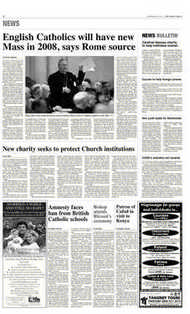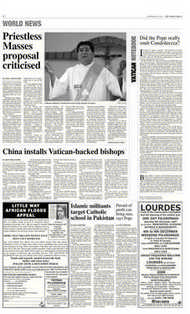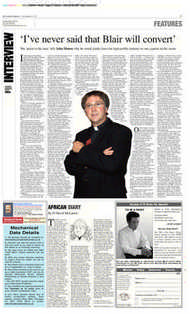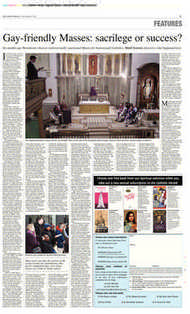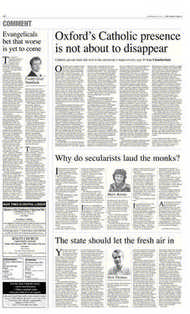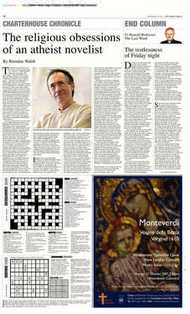Page 12, 28th September 2007
Page 12

Report an error
Noticed an error on this page?If you've noticed an error in this article please click here to report it.
Tags
Share
Related articles
Tinkering With Beckett
Trapped In An Urn
Discovering Beckett's 'lost Masterworks'
Where Goodness, Truth And Beauty Meet
A Sell-out Show That Diminishes Beckett’s Classic
The Lost Library That Shook The World
Not for Beckett purists
Fragments Peter Brook’s stark, minimalist production of five fragments by Samuel Beckett lasts just 55 minutes and takes surprising liberties with the texts. The most famous piece is an elegiac lullaby in which a lonely woman, prematurely old, sits in a darkened room by a window in a rocking chair, listening to her pre-recorded voice. Slowly going out of her mind, she rocks away her life until she dies. As acted by Kathryn Hunter, who speaks directly to the audience and has no rocking chair, the monologue doesn’t have the hypnotising impact it can have.
Three old ladies sit on a park bench, saying nothing. But whenever one of them briefly leaves the stage, the other two whisper some horrifying secret about her. The whispers are inaudible but presumably all three have some incurable disease. The sketch is completely ruined by having two of the women played by men, which immediately invites unwanted laughter.
These fragments, which also include a meeting between a cripple and a blind man and an incomprehensible 20-word libretto without the music, are strictly for Beckett aficionados, but not for Beckett purists. The only enjoyable item is a music hall routine in which two men get out of bed, get dressed, go to work, come home, get undressed and go to bed. One man is miserable; the other is happy. It’s all in mime, it’s very simple, it’s perfectly done and very funny.
A Disappearing Number
BARBICAN
A mathematician, like a poet and painter, is a maker of patterns in which everything is connected to everything else. Maths has never been my strong point. And as for pure mathematics, forget it. The opening scene with a professor filling a blackboard with unintelligible numbers is a witty way to put people off mathematics for ever. How does one make sense of the concept of infinity? What does it mean to say there are different types of infinity? Where will it all end?
In 1913 Professor Godfrey Harold Hardy at Cambridge University received a letter from a self-tutored 26-year-old Indian clerk containing fantastic theorems about prime numbers, one of the great mysteries of mathematics. Hardy invited him to come to Cambridge, which meant the Indian suffered rejection from his caste, friends, neighbours and family. Brahmins are forbidden to cross the seas. The romance and confrontation between East and West is not sufficiently developed in Simon McBurney’s pictorially imaginative production, which spends far too much time on a fictional couple, a modern professor and her American-Asian lover.
The Burial at Thebes
BARBICAN PIT
Sophocles’s tragedy has always been topical ever since it was performed in Athens circa 442 BC. Seamus Heaney’s version is inspired by George Bush and the war in Iraq.
The translation is crystal clear but unexciting. The performances are inadequate and the production is poor. The chorus, dressed in flowing robes, tries to behave like a Greek chorus of old with unfortunate comic results.
The Ugly One
ROYAL COURT
German playwright Marius von Mayenburg has written a short, sharp, funny, but not wholly successful satire on identity, promotion and plastic surgery. An unspeakably ugly man is transformed into an Adonis and finds himself desired by one and all in bed and in the market place. The surgeon, delighted with his success, repeats the operation and soon there are many men who look exactly like him and he quickly loses his popularity and marketability – but not a jot of his narcissism.
blog comments powered by Disqus



